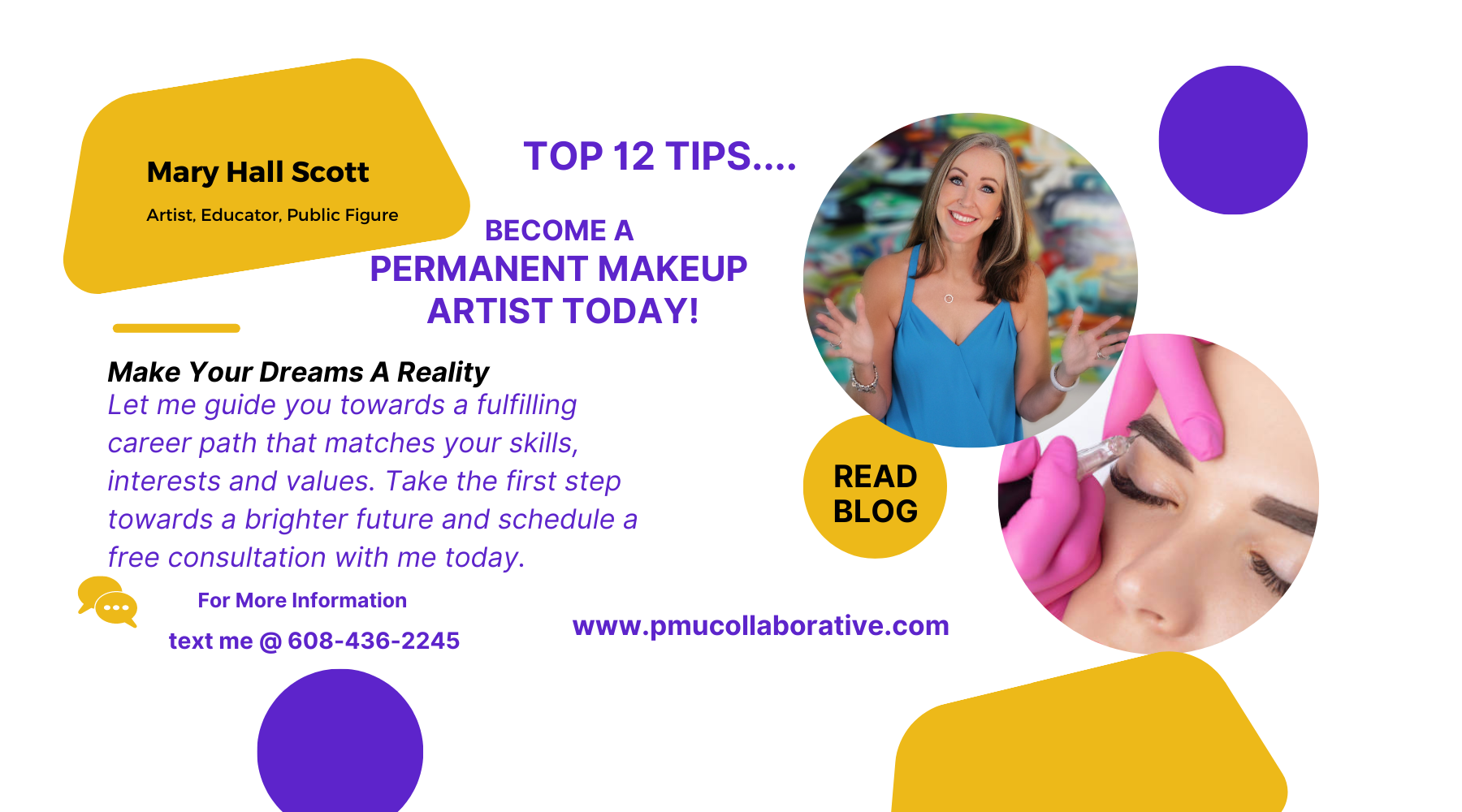Are you interested in becoming a Permanent Makeup Artist?
or
Advancing your current career as a PMU Artist?
Listed below are the top 12 things you should know when considering becoming a Permanent Makeup Artist or advancing your current career.
As times change, just like in any industry you need to adjust and adapt. These are current guidelines to start you on your journey or keep you on the right track.
Becoming a permanent makeup artist typically involves a combination of training, skill development, and obtaining relevant certifications. Here are the general steps you can take to pursue a career as a permanent makeup artist:
- Research the Field: Familiarize yourself with the field of permanent makeup and understand the different techniques and services involved. Decide which services you’re the most interested in to start with. Artists typically learn by starting with tattooing eyebrows. Learn about the current trends and styles.
- Research Training Programs: Look for reputable training programs or academies that offer comprehensive courses in permanent makeup. Consider factors such as program duration, curriculum, instructors' qualifications, and student reviews. Look for programs with both online and hands on training. Lifetime support and retention of training materials should be included.
- Enroll in a Training Program: Select a training program that suits your needs and goals. These programs typically cover topics such as sanitation, color theory, skin anatomy, different techniques (eyebrows, eyeliner, lip liner, etc.), equipment handling, and safety protocols. Enroll in a program that covers these topics and more. Research the trainers or founders of the program.
- Complete Training and Practice: Attend the training program and actively participate in hands-on practice sessions. This will allow you to develop your skills and gain practical experience under the guidance of instructors. Hands on training is a must following any education.
- Obtain Required Certifications: After completing your training, check if there are any certifications specific to your location that you need to acquire. In some regions, a bloodborne pathogens certification may be required to ensure you understand and can implement proper sanitation procedures.
- Comply with Licensing Requirements: Research the licensing requirements for permanent makeup artists in your area. Some regions may require you to obtain a license or permit to legally practice permanent makeup.
- Build a Portfolio: Develop a portfolio of your work to showcase your skills and expertise. Include high-quality photographs of the different procedures you have performed, highlighting your best work.
- Gain Experience: Seek opportunities to gain practical experience in a professional setting. This can involve working under the supervision of an experienced permanent makeup artist, apprenticing at a salon or spa, or even offering services to friends and family.
- Network within the Industry: Attend industry events, join professional associations, and network with other makeup artists, cosmetologists, and professionals in the beauty industry. Building connections can help you find job opportunities and stay updated on the latest trends and techniques. “Boots on the Ground” will build a trusted business model.
- Consider Specialization: Permanent makeup offers various specialties such as: Areolas, Scar camouflage, Scalp Micropigmentation or Tiny Tattoos. Consider specializing in a specific area to differentiate yourself and cater to specific client needs.
- Continuously Educate Yourself: The field of permanent makeup is ever-evolving, so it's essential to stay updated with new techniques, tools, and safety practices. Attend workshops, seminars, and advanced training programs to enhance your skills and knowledge.
- Set Up Your Business: If you plan to operate as a self-employed permanent makeup artist, research the legal and business requirements for setting up your own practice. This may include obtaining any necessary permits, licenses, liability insurance, and setting up a suitable workspace.
Remember, the steps to becoming a permanent makeup artist may vary depending on your location and specific circumstances. It's important to research and comply with the regulations and requirements in your area to ensure you establish a legitimate and successful career in this field.
Mary Hall Scott





